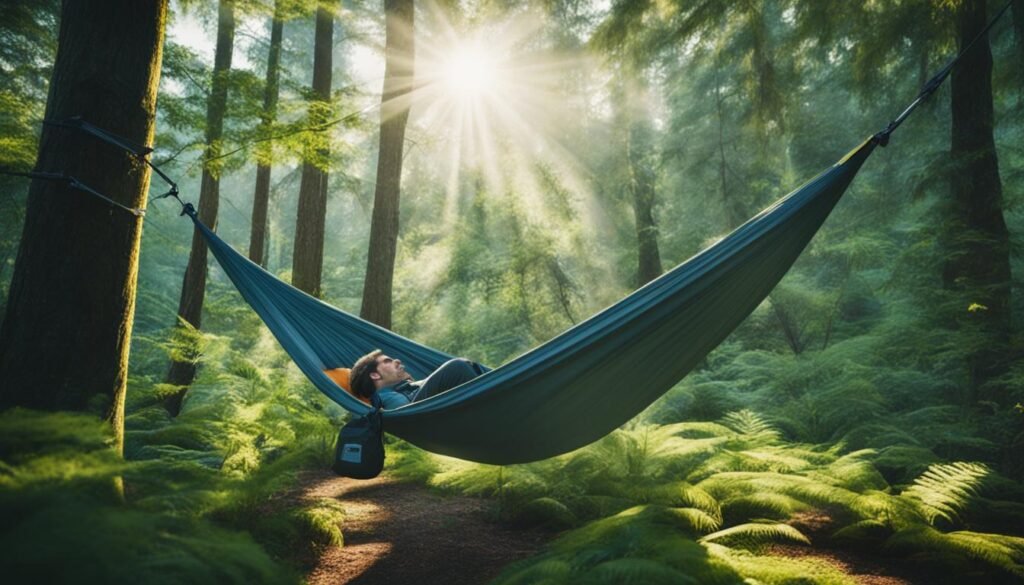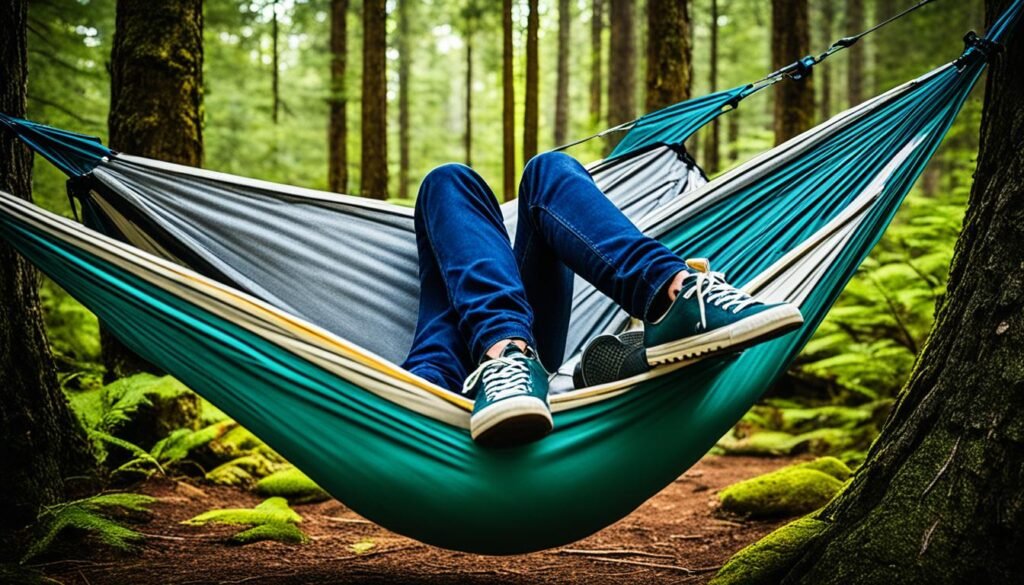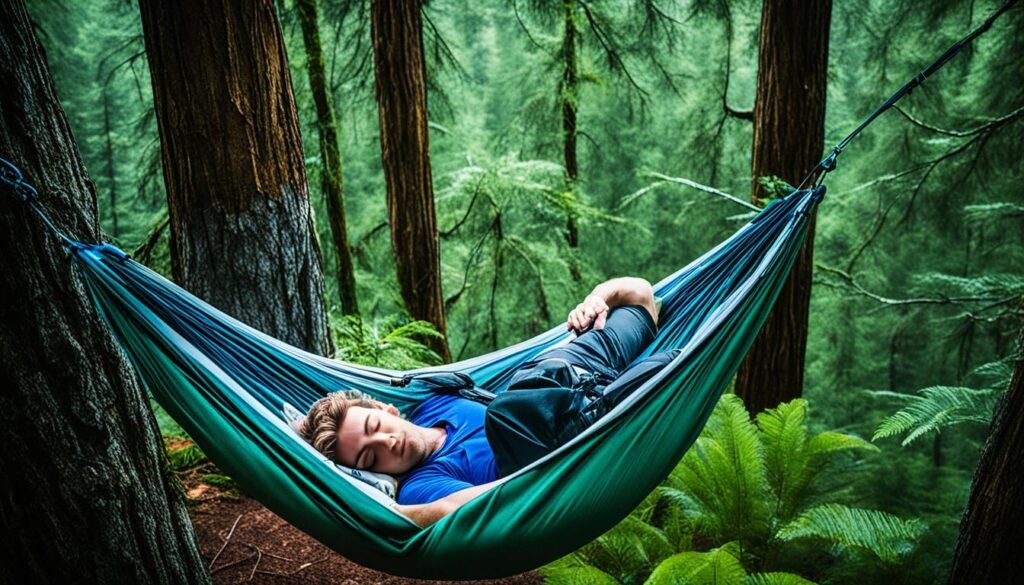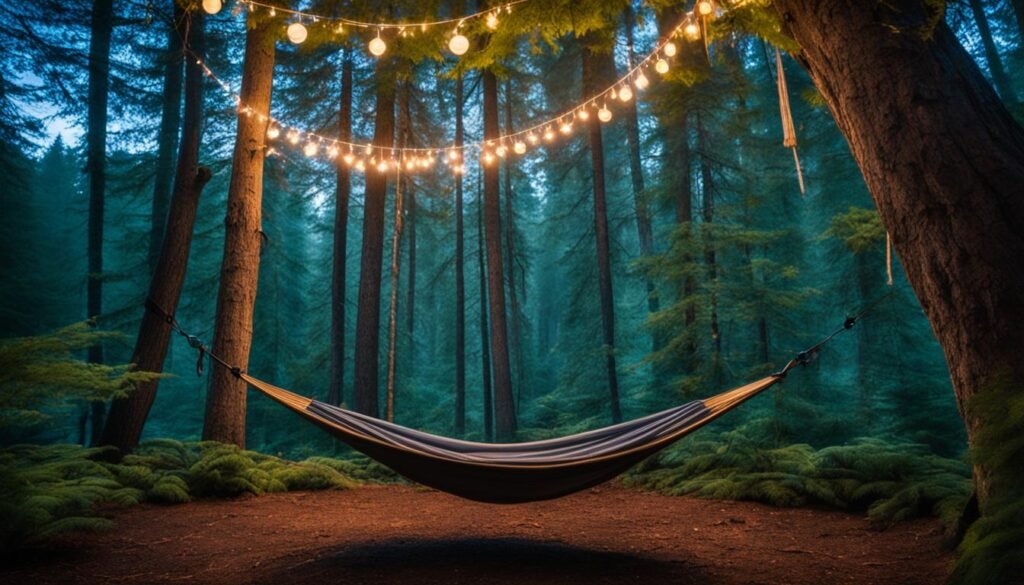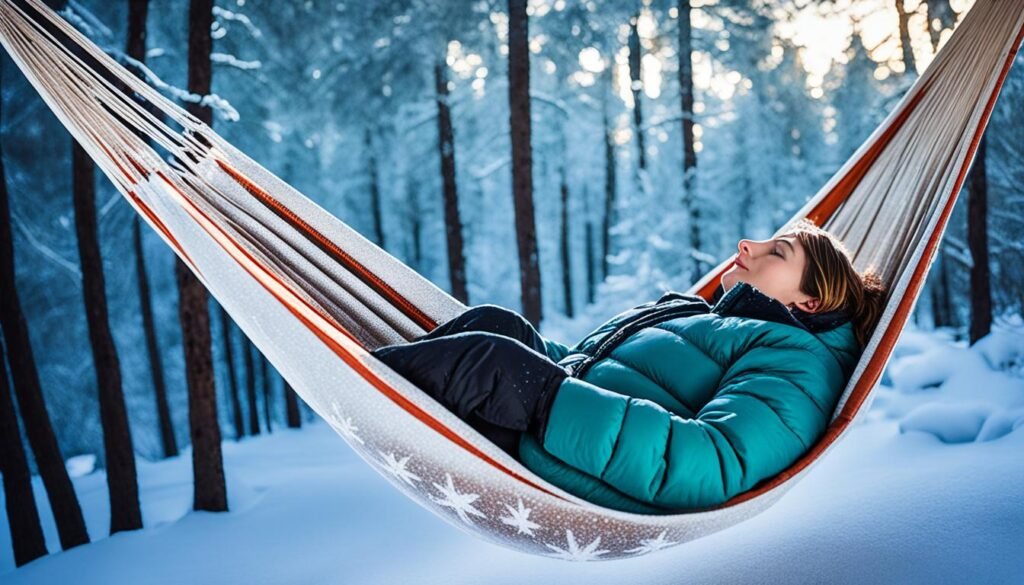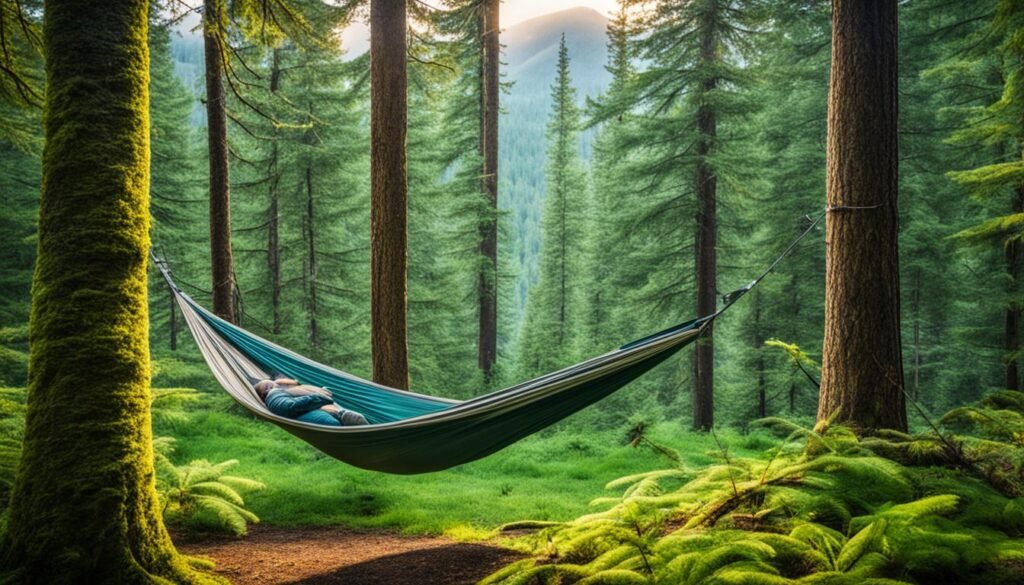Hammock camping and tent camping are two great ways to enjoy nature. Each has its own benefits and drawbacks. This article will explore the advantages and disadvantages of both, so you can make a good choice for your next trip.
Hammock camping is great if you want comfort and to travel light. It lets you sleep off the ground, which can be more comfy. You can also set up a hammock almost anywhere with trees.
Tent camping is good for staying safe from weather. Tents give you more room, privacy, and work well for groups or alone. You need flat ground to set up a tent, but then you’re all set.
Let’s dive deeper into the benefits and downsides of each way to camp. This will help you decide better.
Key Takeaways:
- Hammock camping and tent camping offer unique outdoor experiences.
- Hammock camping provides comfort, flexibility, and lightweight portability.
- Tent camping offers shelter, space, and privacy.
- Choose hammock camping if you prioritize comfort and adaptability.
- Opt for tent camping if you value shelter, spaciousness, and privacy.
Pros of Hammock Camping
Hammock camping is loved by many outdoor fans for good reasons. Sleeping in a hammock reduces pressure points. It supports a natural sleep posture. Hammocks are light and small, making them easy to take along.
They also offer flexible campsite choices as they can hang between trees. This means you don’t need flat ground. Hammocks offer great airflow, can be used as chairs, and are kinder to the environment.
Let’s dive deeper into these perks:
1. Comfort
Hammocks give you a cozy place to sleep. They ease pressure points for a comfy posture. Their gentle sway may help you sleep better, too.
2. Lightweight and Compact
Hammocks are perfect for backpacking because they’re so light and small. They make carrying gear easier and lighten your load. This is easier on your back and joints.
3. Flexibility in Campsite Selection
Hammocks let you set up camp in more places. You don’t need flat ground, just some trees or sturdy points. This means you can camp in special spots where tents can’t go.
4. Better Ventilation
Hammocks keep you cooler by letting air move freely. This reduces sweat and makes summer nights more comfortable. The open design helps a lot with this.
5. Multi-Purpose Functionality
You can use a hammock as a seat during the day. It’s a cozy spot for reading or enjoying views. This adds value to your camping gear.
6. Environmental Friendliness
Hammock camping leaves a smaller mark on nature. It avoids the need for a classic tent. This approach lets you enjoy the outdoors responsibly.
Hammock camping is great for comfort, carrying ease, location choice, and the planet. It’s a smart choice for simple backpacking or a unique outdoor adventure.
| Advantages of Hammock Camping |
|---|
| Comfortable sleeping posture |
| Lightweight and compact |
| Flexibility in campsite selection |
| Better ventilation |
| Multi-purpose functionality |
| Environmental friendliness |

Cons of Hammock Camping
Hammock camping has its downsides too. Before choosing this camping style, it’s key to know these limits.
Single Occupancy:
Hammocks usually fit just one person. In contrast, tents can hold several people. This can be hard if you camp with others. It limits where everyone can sleep.
Tree Availability:
Not all places have good trees for hammocks. The right trees need to be strong and well-spaced. Without them, setting up a hammock can be tough.
Add-on Gear:
Hammocks often need extra stuff like bug nets and rainflies. These protect you from bugs and bad weather. But, they also make your gear heavier and more expensive.
Privacy and Interior Space:
Hammocks offer less privacy and space than tents. They’re open, so there’s not much room for your things. Campers who want more privacy or space might find this a problem.
Yet, hammock camping has many fans. Knowing its limits helps campers prepare better. This way, they can still have a great time outdoors.
Pros of Tent Camping
Tent camping is loved by many who enjoy the outdoors. Tents give you a place to stay safe. They have enough room and privacy. Let’s look at what makes them great.
1. Shelter and Protection
Tents are a safe spot away from bad weather and bugs. They keep you dry when it rains and safe from the wind. They help you sleep without insect bites.
2. Ample Interior Space
Tents have a lot of room inside. You can easily move and keep your stuff. Whether you’re alone or with friends, there’s space to be comfy.
3. Privacy
A tent gives you your own spot. It’s perfect for changing or having alone time. A tent is a cozy place for peace and rest.
4. Versatility for Different Camping Scenarios
Tents are perfect for any camping trip. They work well for one person or a group. Whether it’s a family trip or a hike with friends, tents are a good choice.
Tent camping has what you need: shelter, space, and privacy. It’s a top pick for outdoor lovers. Tents are good for many camping types. They keep you safe and give you your own space.
| Pros of Tent Camping |
|---|
| Provides shelter and protection from elements. |
| Offers ample interior space for comfortable movement and gear storage. |
| Provides privacy for personal space. |
| Versatile for different camping scenarios, accommodating solo campers and groups. |
Cons of Tent Camping
Tent camping can be fun, but it has its downsides. Knowing these can help you decide if it’s right for you.
Setup Time and Effort: Setting up a tent takes time and effort. This is especially true for big tents. You might need help from others.
Bulkiness: Tents are bulkier and heavier than hammocks. This makes them hard to carry for backpacking or long hikes. The extra weight and size can slow you down.
Flat and Even Ground Requirement: Tents need flat, even ground. This can be hard to find in some places. It may limit where you can camp.
Heat and Moisture Trapping: Tents can get hot and hold moisture inside. This is common in warm, humid weather. It can make the tent feel less comfortable and might make things inside damp.
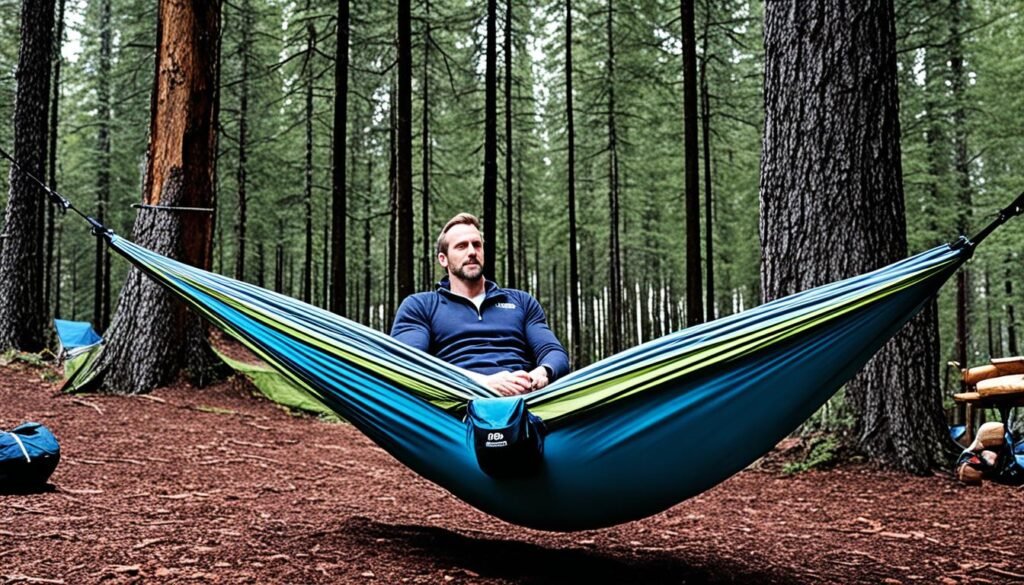
Even with these issues, many people love tent camping. They enjoy the shelter, space, and privacy it offers.
| Drawbacks of Tent Camping | Overview |
|---|---|
| Setup Time and Effort | Time-consuming and may require assistance, especially for larger tents |
| Bulkiness | Heavier and larger than hammocks, less convenient for backpacking and long-distance hiking trips |
| Flat and Even Ground Requirement | Needs flat and even ground for proper setup, limiting options in certain camping locations |
| Heat and Moisture Trapping | Tents may trap heat and moisture, leading to condensation issues and discomfort |
Tent camping remains popular despite its cons. People value the shelter, space, and privacy it provides.
Conclusion
Choosing between hammock camping and tent camping depends on what you like and need. Each has its pros and cons that affect your time outdoors.
Hammock camping is great if you want comfort and to carry less weight. It lets you sleep without pressure points and gives good airflow. You can hang it between trees for amazing views. But, it’s mostly for one person and needs trees or points to set up.
Tent camping gives more shelter, space, and privacy. You can move easily inside, store stuff, and fit more people. Tents protect well against weather and feel more like traditional camping. Yet, they are heavier, need more time to set up, and can get hot and moist inside.
Think about what you need outdoors. If comfort, ease, and carrying less is key, choose hammock camping. If you want more room and privacy, go for a tent. Consider what matters most for your outdoor trip and the gear you have.
Both hammock and tent camping make for great adventures. Pick the one that matches your likes, needs, and the camp’s demands.

Additional Considerations
Choosing between hammock and tent camping involves several factors. These can shape your camping experience.
Camping Gear
Think about your camping gear’s availability and fit. Hammock camping needs a hammock, suspension system, bug net, and rainfly. Tent camping needs a sturdy tent, stakes, and groundsheet. Both can use sleeping pads and insulation for comfort.
Weather Conditions
Consider the weather at your camping site. Look up the forecast for temperature, rain, and wind. This helps you pick the right gear. If it’s cold, bring warm insulation and a sleeping bag. If there’s rain, ensure your gear is waterproof.
Camping Location
Your camping spot affects your choice. A dense forest suits hammock camping well. Open or rocky areas are better for a tent. Think about tree availability or flat ground in your decision.
Personal Comfort
Your comfort matters in choosing between hammock and tent camping. Reflect on your sleep habits and needs. Hammock camping might suit if you like sleeping suspended. If you prefer a bed-like feel with room to move, choose tent camping.
In summary, consider gear, weather, location, and comfort when choosing. These factors help ensure a fun and prepared camping trip.
Expert Opinions on Hammock Camping vs. Tent Camping
Choosing hammock or tent camping is a big decision. Asking experts and experienced campers for advice is smart. They offer insights from real camping experiences.
Hammock camping has its perks, say experts. It’s comfy and flexible. You sleep off the ground, which feels great and keeps pressure off. Plus, hammocks are light and perfect for hiking.
Tent camping has its own advantages, though. Tents give you shelter and protection. They have space for your stuff and for moving around. Tents work well for one person or a group.
In the end, learning from experts helps you understand hammock and tent camping better. Look for information from good sources and camping groups. Then, you can choose what’s best for you.
FAQ
Is hammock camping better than tent camping?
Choosing between hammock and tent camping depends on what you prefer and where you’re camping. Each has its own benefits and downsides.
What are the pros of hammock camping?
Hammock camping is comfy, flexible, and easy to carry.
What are the cons of hammock camping?
Its downsides include only fitting one person and needing trees to set up.
What are the pros of tent camping?
Tent camping gives you shelter, more room, and privacy.
What are the cons of tent camping?
The negatives are it takes time to set up, it’s bulky, and you need flat land.
Are there additional considerations when deciding between hammock camping and tent camping?
Yes. Think about what gear you have, the weather, location, and your comfort.
Where can I find expert opinions on hammock camping vs. tent camping?
Find expert views from experienced outdoors people. Look at reliable sources, outdoor forums, and camping groups.

